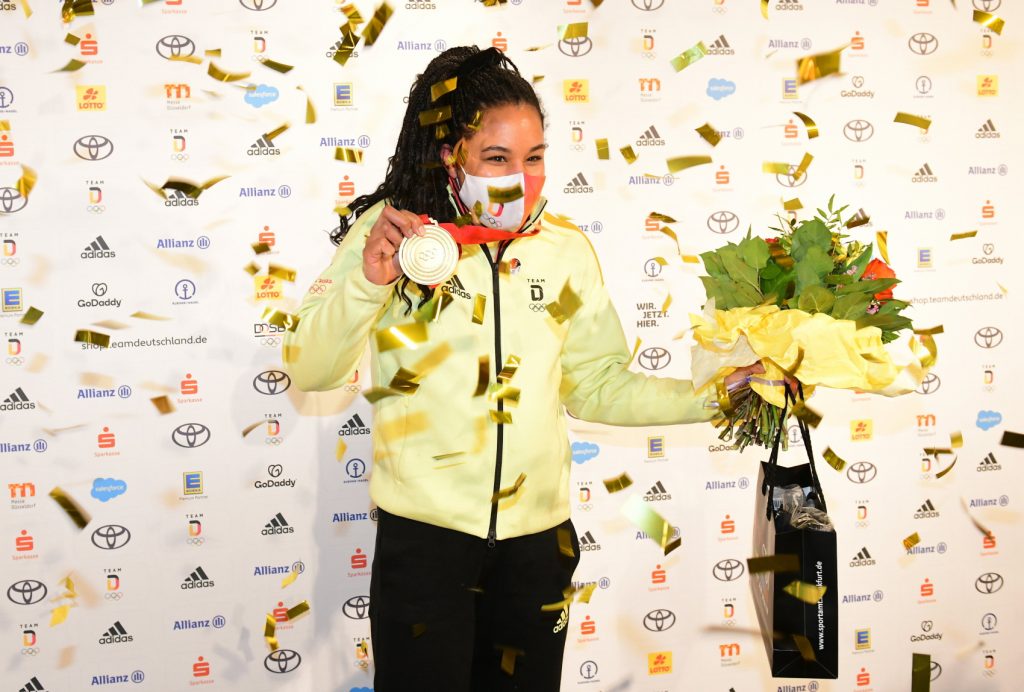“Our diversity can make us special hosts”
Deborah Levi (26) is a successful German bobsledder, was Olympic champion in the two-woman bobsleigh together with Laura Nolte in Beijing 2022 and is also a member of the Anti-Racism Working Group of Athleten Deutschland e. V. and an ambassador for Frankfurt as a host city for the 2024 European Football Championships. To mark the International Day for the Elimination of Racial Discrimination (March 21), we spoke to her about racism in sport and the 2024 Super Sport Year.

How present is racism in German sport?
Racism is a problem for society as a whole and is structurally anchored in German society, partly due to its historical past, such as colonization. Racism can manifest itself in different ways in everyday life, for example when people with non-typical German surnames have problems finding an apartment or a job, when children with a migrant background are given lower marks at school for the same performance or are not recommended for grammar school. As sport does not exist in isolation from society, it is also not free from structural racism.
Unfortunately, we still frequently experience cases of individual racism in soccer stadiums during the weekend. But even in the everyday lives of us athletes, there are comments that are not necessarily always meant in a malicious way, but which still refer to skin color or origin in a discriminating way.
In addition, there are hardly any studies in Germany that deal with structural racism in elite sport, which is a research gap that needs to be closed. A joint research project between the German Sport University and the Humboldt University in Berlin is now addressing this issue.
In my opinion, sport as a whole offers a great platform for breaking down prejudices. However, a lot still needs to change outside of sport, because sport alone cannot solve all social problems.
In addition to your studies and your professional career, you are a member of the anti-racism working group at Athleten Deutschland e. V.. What approaches are you pursuing in the fight against racism in sport?
We were founded in 2020 after the murder of George Floyd in the USA on the initiative of Athleten Deutschland e. V. to do remembrance work at various levels, to reduce racism in sport and to take a clear public stance against racism and discrimination.
It is important to us that awareness of racism in sport is raised at association level, but also in coach training, and that everyone is obliged to deal with anti-racism and anti-discrimination measures and knows how to behave in such situations. Another element is a contact point for younger people affected by racism, where they can report racist incidents.
You are ambassador of the host city Frankfurt for EURO 2024. Can international sporting events help to reduce discrimination and bring us closer together as a society?
2024 is a super sports year for Europe. I’m really looking forward to the European Football Championships in my home country and, of course, the Olympic and Paralympic Games in Paris, which I hope to attend as a spectator as well. The Olympics in particular, but also other major events, are always an opportunity to show that many people with different cultural backgrounds, regardless of their sexual orientation, can come together peacefully to play sport together, have fun and compete against each other in a respectful way. Sport provides a great platform. However, I think that a lot still needs to happen outside of sport.
The DOSB is on the way to bidding for the Olympic and Paralympic Games. What do you expect from a German bid concept in terms of anti-racism and anti-discrimination?
I would like to see sporting events that welcome everyone, that are inclusive and that take measures to raise awareness in advance – I would like to see games that are free of discrimination and racism and that respect human rights in every aspect. To reach this goal, minorities could be involved in the preparation process in order to break down barriers and create awareness so that racist or discriminatory incidents can be avoided.
More than a quarter of people in Germany have a family history of immigration. Could this make us special hosts?
Yes, definitely! At EURO 2024, we will see just how diverse Germany is. People of almost 200 different nationalities live in Frankfurt alone. I think that Germany has this little peculiarity of being more culturally diverse than many people think and that can make us special hosts for the Olympics.







 Your Ideas
Your Ideas